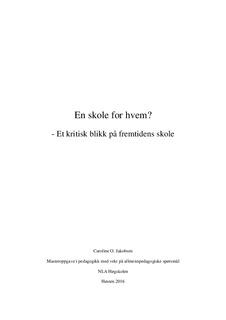En skole for hvem? : et kritisk blikk på fremtidens skole
Master thesis
Permanent lenke
http://hdl.handle.net/11250/2429529Utgivelsesdato
2016Metadata
Vis full innførselSamlinger
Sammendrag
Formålet med denne studien har vært å kartlegge og kategoriserer ulike forståelser som omhandler elevers kompetanseutvikling i Ludvigsen-utvalgets del- og hovedutredning, for deretter å problematisere disse. Utgangspunktet for studien er utdanningspolitikk, og hvorvidt diskurser innenfor denne konteksten bidrar til å legitimere krav, forventninger og mål som settes til elever, og hvorvidt dette kan komme til å prege vår oppfattelse av skolens samfunnsmandat. Problemstillingen til denne masteroppgaven er: Med fokus på elevers kompetanseutvikling, hvilke diskurser er fremtredende i Ludvigsen-utvalgets del- og hovedutredning? For å kunne besvare problemstillingen har jeg utført en diskursanalyse, der jeg analyserte delutredningen – Elevenes læring i fremtidens skole : Et kunnskapsgrunnlag, og hovedutredningen – Fremtidens skole : Fornyelse av fag og kompetanser.
Det metodiske rammeverket er inspirert av ulike diskursanalytiske tilnærminger, noe som innebærer at oppgaven har en eklektisk tilnærming til analysen. Gjennom diskursanalysen ble totalt åtte diskurser identifisert. I tillegg ble det identifisert tre latente budskap i utredningene. Disse funnene har blitt drøftet opp mot oppgavens teoretiske rammeverk, som har søkt å skissere et bilde av norsk utdanningspolitikk. Her har utvalgte aspekt ved skolens samfunnsmandat blitt beskrevet.
Oppgavens hovedfunn handler om at diskursene bærer preg av en instrumentalistisk forståelse knyttet til elevers kompetanseutvikling, og dermed også av skolens samfunnsmandat. Ettersom instrumentalistiske faktorer får stor vekt, ser det ut til at særlig nyttedannelse vektlegges. Videre etterlyses en problematisering av begrepet tilpasset opplæring, som synes å være et sentralt element i dokumentenes pedagogiske innfallsvinkel.
Summary:
The purpose of this study was to identify and categorize the different understandings that deal with pupils' competence in the Ludvigsen Committees Official Norwegian Reports, then to problematize these understandings. The starting point for the study is education policy, and whether discourses within this context helps to legitimize the demands, expectations and goals set for pupils, and how this has come to influence our perception of the school's social mandate. The research question to this master thesis is: Focusing on students competence development, which discourses are prominent in Ludvigsen Committees reports? To answer the research question I have conducted a discourse analysis, where I analyzed the interim report - Pupils' learning in school of the future : a knowledgebase, and the main report – The School of the Future : Renewal of subjects and competences.
The methodological framework is inspired by different discourse analytical approaches, which means that the method of analysis is inspirerd by tools from various theorists. Through the discourse analysis, a total of eight discourses was identified. In addition, three latent messages were identified in the reports. These findings have been argued in the light of the theoretical framework that outlines a picture of the Norwegian education policy, in which selected aspects of the school's social mandate are described.
The key finding is that the discourses are marked by an instrumentalism perspective of pupils' competence, and thus of the school's social mandate. Seeing that instrumentalism has been given a considerable weight, and in light of the “bildung” perspective, utility “bildung” is emphasized. Moreover, I recall for a critique of the concept of adapted teaching, which seems to be a key element in the documents' educational approach.
